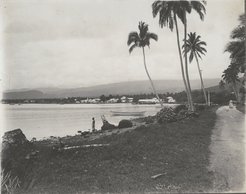The role of local knowledge in german courts in the Pacific
Research Project

In 1909, a German judge named Dr. Erich Schultz, who at some point also underwent the painful process of receiving the pe'a (traditional Samoan lower body tattoo), penned divorce judgments in a tight Kurrentschrift—in the Samoan language. Nine thousand kilometres northeast, in the German leased territory of Kiautschou, marriages between Germans and Japanese were announced in the government gazette, yet those between Germans and Chinese went unannounced although both marriages were legally recognized. Within Germany’s colonial holdings in the Pacific, both citizens and members of the colonial administration blurred and sharpened the lines between colonizers and the colonized, attempting to assimilate and to impose assimilation, deepening German roots within the local culture.
Over the past decade, research on the German colonies has seen more attention. The reason for attention to these areas has to do with the recent attention on Germany’s colonial past and retribution for colonial exploitation and atrocities. In my doctoral thesis, “German identity, intermarriage, and divorce in Samoa: 1900–1914”, which will be published in late 2023, I used the unique situation in Germany’s colony in Samoa to highlight the similarities and differences in legislation regarding marriage and divorce, the legal plurality in matters of family law depending on an individual’s personal jurisdiction, and how this legislation actually was interpreted by the administration and its courts. During the course of research, it became clear that local knowledge played a significant but often-implicit role in judicial proceedings, and that this was especially true in matters of family law. Therefore, in this research project, I will use my previous research on Samoa as a springboard to discover to what extent local knowledge influenced other German courts in its Pacific holdings, and how it was used to delineate the subaltern and define German identity.
I elaborate on a cohesive theoretical framework to trace and explain the social diffusion of local knowledge within German courts, and apply an interdisciplinary approach relying strongly on anthropology and post-colonial studies. Knowledge is defined as comprising discourses, practices, rules, norms and principles. Limitations of formalized procedures have been a topic in social sciences for some time. Yet scholars from the fields of legal studies or legal history have long been used to focusing on formal procedures, while paying less attention to how other forms of knowledge become involved in the formation of legal expertise. As scholars from these fields become more receptive to contributions from social sciences, the relevance of local or tacit knowledge is increasingly being considered, for example when studying colonialism. In my proposed project, I hope to pick up on this interdisciplinary exchange. Specifically, I hope to be able to build on the contemporary concept of historical regimes of normativity proposed by Thomas Duve in my own attempt to study intricate links between local knowledge and the production of formalized legal knowledge in and through German courts. I aim to harness the concept of historical regimes of normativity to explore the mutual rather than unilateral construction of legitimate legal knowledge in German civil courts. In doing so, I argue that while power-asymmetries can of course not be overstated in studies of colonial rule, the production of knowledge should also not be reduced to these asymmetries. By contrasting formal legal knowledge with different insights from historical documents, I become able to provide more nuanced accounts of the actual production of knowledge by paying attention to how knowledge is socially and culturally situated.
